BY DARRELL HOPE & ROB FELD
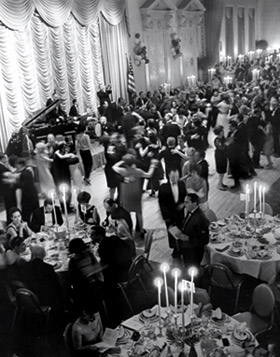 CHEEK TO CHEEK: Dancing at the Waldorf Astoria in
CHEEK TO CHEEK: Dancing at the Waldorf Astoria in
New York for the 1966 Awards.
Ask any DGA Award recipient about the experience of winning and you will be hard-pressed to find one who doesn't immediately launch into an excited tale of who presented it and what the night meant to them. Take for instance Sam Mendes' recollection of his win for his 1999 film American Beauty. "There was Steven Spielberg winning the Lifetime Achievement that year. Francis Coppola presented Steven with his award, and the next one up was me. It remains one of the most bizarre moments of my life. I've gotten more pleasure out of it in recent years than I did at the time because you're kind of too numb to take in what's really going on."
For all the rambling speeches, marketing campaigns and self-congratulation that arrive annually with awards season, it seems the familial nature and collegial spirit of the DGA Awards has changed the least in the 60 years since it started. The fact that voting is done by DGA members working in the craft and that the evening has remained a celebration of that craft, rather than an extravaganza, has allowed the Awards to maintain its sheen. "It's really just about recognizing accomplished directing," says former DGA Awards Committee Co-chair John Rich. "We have a dignified program and the award means a great deal in our industry."
Regardless of what they had accomplished in their careers, directors always seemed to be in awe of the Awards and their colleagues who have come before them. Upon being presented with an Honorary Life Membership in 2002, former DGA President Del Mann said, "I am very moved by it, but I feel totally unworthy compared to the great people in the industry who have received this award through the years, people like Frank Capra, George Sidney, and David Lean. Why they chose me I simply don't know."
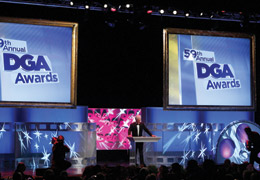 THE BIG NIGHT: President Michael Apted at the podium for
THE BIG NIGHT: President Michael Apted at the podium for
the 2007 Awards. (Credit: Kevin Winter/Getty Images)
While the presentation of the Awards has maintained its dignity, that doesn't mean there haven't been memorable gaffes. One of the best was from Mike Nichols. "There was the time when I accepted best director and I hadn't won it!" recalls Nichols of his errant trip to the stage in 1966. "Walter Matthau wasn't quite clear and it turned out he was just announcing the nominees. I didn't know. I got up and spoke very movingly for three or four minutes, and then he said, 'Fred Zinnemann,' and went on with the rest of the nominees. As soon as Fred won [for A Man for All Seasons] and made his actual acceptance speech, he walked straight to where I was sitting and said, 'Lunch tomorrow? I'll come to your studio.' I mean, those were some guys!"
They did have lunch, and Nichols speaks happily of the welcoming friendship he received from his fellow Guild members after his premature annunciation. And the story has a Hollywood ending—he won the following year for The Graduate.
It was this congenial atmosphere that was envisioned by the late George Marshall, president of the Screen Directors Guild in 1948 when the Awards was first conceived. "This is to be a family affair," said Marshall at the time. "The purpose of the program is to give credit where credit is due and to enhance the position of the director in the eyes of the press, the public and the industry. We feel that no one is better suited to select the best-directed pictures than directors themselves."
Years later this still seems to be the case. "To have other directors wish to award you in this way is amazing," said Peter Jackson upon winning for The Lord of the Rings: The Return of the King in 2003. "I think one of the real celebrations tonight is just how amazing the nominated films and directors are, the diversity of the films in the different genres and budgets."
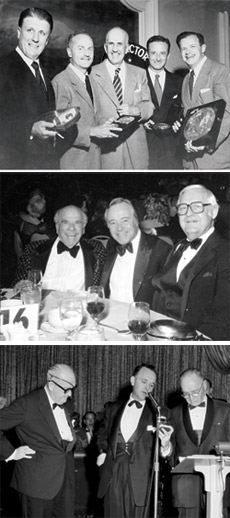 Initially, the model for the DGA Awards was different than it is today. Awards were presented for the best-directed picture of each quarter of the year, with an annual overall award given to what was deemed that year's outstanding directorial achievement. The work was to be judged solely on excellence of directorial craftsmanship, regardless of type of picture, studio, shooting schedule or budget, so long as it was released in the metropolitan area of Los Angeles within the period for which is was nominated. Indeed, one of the unique aspects of the Awards that continues today is that any feature film or documentary director is eligible for a DGA Award, regardless of whether he or she is a member of the Guild.
Initially, the model for the DGA Awards was different than it is today. Awards were presented for the best-directed picture of each quarter of the year, with an annual overall award given to what was deemed that year's outstanding directorial achievement. The work was to be judged solely on excellence of directorial craftsmanship, regardless of type of picture, studio, shooting schedule or budget, so long as it was released in the metropolitan area of Los Angeles within the period for which is was nominated. Indeed, one of the unique aspects of the Awards that continues today is that any feature film or documentary director is eligible for a DGA Award, regardless of whether he or she is a member of the Guild.
Under the guidance of the original members of the Awards Committee—George Sidney, Frank Capra, Delmer Daves, John Ford, Bruce Humberstone, Irving Pichel, Norman Taurog and ex-officio George Marshall—balloting began on Aug. 1, 1948. Then during the Screen Directors Guild's general membership meeting at the Roosevelt Hotel on May 22, 1949, the first quarterly awards were given to Fred Zinnemann for The Search, Howard Hawks for Red River, Anatole Litvak for The Snake Pit and Joseph Mankiewicz for A Letter to Three Wives. Mankiewicz would also be named the winner of the first annual award for best directorial achievement for 1948-49.
By 1952, the family affair had grown into an elegant dinner-dance gala at the Biltmore Hotel in downtown Los Angeles. In a rather colorless description that could almost make one wish Page 6 was there, Citizen News motion picture and drama editor Lowell Redlings reported on the second annual event in February 1953, saying that, "The dinner-dance was quite a festive affair. Dancing to Freddie Martin's orchestra was the popular diversion of the night. The formal part of the evening started with Jane Powell singing 'The Star-Spangled Banner.' Then came introductions of special guests, such as Mayor Fletcher Bowron, Sheriff Eugene Biscailuz, and Postmaster Michael Fanning. Telegrams were read from Gov. Earl Warren and Vice President Richard Nixon."
The following year, Cecil B. DeMille was honored with the first D.W. Griffith Award for distinguished achievement in motion picture direction. (The Griffith Award was later renamed the Lifetime Achievement Award.) Humbled by the award, DeMille told the gathering that Griffith "was the first man to have the camera photograph thought. This brought 'Why?' into motion picture-making; before that it was mostly 'What?' through the use of action on the screen." Even for someone as accomplished as DeMille, it seemed impossible for one director to succeed without acknowledging the work of his predecessors.
The quarterly awards that year went to directors Charles Crichton (The Lavender Hill Mob), Joseph L. Mankiewicz (5 Fingers), Fred Zinnemann (High Noon) and John Ford (The Quiet Man). Ford was also named winner of the annual prize, but was on location filming in Africa, so a recording of the entire evening was sent to him, replete with a 1,000-guest rendition of "Happy Birthday" sung in his honor, led by crooner Dean Martin.
It was around this time that television was coming into its own and, with the success of the feature film awards, SDG's Television Council petitioned the Guild in 1952 for inclusion in the honors. "I think it was inevitable," said Rich. "When television started to sprout, it was determined by the Board to make an award for the recognition of television directors."
Needless to say, as soon as the initial Awards were announced in 1948, suggestions on how to improve them began to be proffered. Even then the idea that every member would be able to view and vote on every film under consideration was acknowledged as impossible, and once television came into the mix, that problem only multiplied. The process had to be streamlined so that the nomination and balloting would not only be fair to the potential candidates but also prove feasible for the voters.
The Council proposed that a new format should be adopted that included a two-stage process that winnowed all the potential nominees down to five. A final balloting that would determine the overall winner. The proposal was accepted and at the SDG's Third Annual Awards Dinner on Jan. 24, 1954, director Robert Florey and AD Bruce Fowler accepted the Guild's first honors for television for the 1953 television production The Last Voyage. It was in these early years the tradition of recognizing the director's team along with the director began and has continued to the present day.
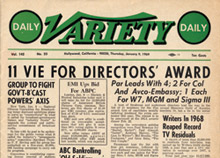
As the Guild grew, so too did the Awards. By the 1960s the method of doling out the feature film awards each quarter was eliminated and replaced by the modern protocol of selecting five nominees from which the final winner would be selected. In order to accommodate the widest number of members possible, those nominated films were then screened for the membership for one week around the country just prior to the final ballot deadline. In an effort to be as democratic as possible and represent all members equally, the Awards was inherently imbued with a sense of history that persists today.
There's something about the DGA Awards that evokes a level of humility in its recipients. This could be seen as recently as last year when Martin Scorsese won his first DGA Award for The Departed after seven nominations. "It's overwhelming for me," he told the gathering. "Most of these directors made films that shaped me as a person and for better or worse as a filmmaker, so I have to keep reminding myself that even though I'm receiving an honor they received, it doesn't necessarily make me one of them. I wanted to be them, but over the years of making movies I realized it was impossible. I rationalized that I'm from another time and place, and I reflect my world today just as they reflected their world and the Hollywood in which they worked."
But the Guild itself was evolving through the 1960s and creating its own history. In 1961 the SDG merged with the New York-based Radio and Television Directors Guild (RTDG) to become the Directors Guild of America. Starting with the Awards show in 1961, attempts were made to hold events on the same day in both New York and Los Angeles. But the three-hour delay, without the advantage of today's satellite hookups, remained a problem. In addition, there was a desire to have all director nominees, their teams and the special awards recipients share the evening together under one roof rather than be split up into two separate events.
While the bicoastal awards were discontinued in the late '90s, in 1999 the DGA Honors Gala was created to take place in New York. "The notion was to do something in New York that brings the DGA into very clear focus as a bicoastal union," said DGA Board member Ed Sherin. "The difference between the DGA Awards and the DGA Honors is that the honoree is notified and, in every instance but one, the DGA honoree is not a member of the DGA. They come from every conceivable professional vocation that contributes to film and television and to the artistic community in general."
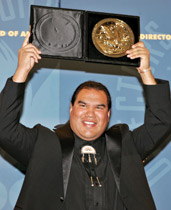 The Guild truly was becoming more bicoastal and by 1971, membership had increased to 3,800 people. With diversity in the membership and the kinds of entertainment members were producing, it became necessary for television honors to be subdivided by genre for the first time.
The Guild truly was becoming more bicoastal and by 1971, membership had increased to 3,800 people. With diversity in the membership and the kinds of entertainment members were producing, it became necessary for television honors to be subdivided by genre for the first time.
"Usually people who did dramatic shows were the winners," said Rich, recalling that historic night in 1971. "I figured I'd win one of the basic awards for comedy directing and lo and behold, I won the best television director of the year for an episode of All in the Family! It was thrilling. It was completely unexpected, so I was shocked. I don't think another comedy ever got that honor. It was very gratifying."
Beyond expanding recognition for new genres, the Guild and the DGA Awards strove to expand recognition and opportunities for its female and minority members. In 1955, for example, Francisco "Chico" Day, the first Mexican-American member of the DGA, had been recognized for his AD work on George Seaton's The Country Girl. Then in 1981, he was awarded the Frank Capra Award for career achievement.
In this vein, the Guild began negotiations with major studios and production companies in 1983, attempting to eliminate discriminatory hiring practices. At this point, no woman or person of color had yet been honored as a director, but in 1984, Sharron Miller cracked the gender barrier when she picked up a daytime dramatic show award for her direction of the ABC Afternoon Specials "The Woman Who Willed a Miracle." The same year Thomas Carter became the first African-American to win a DGA Award for his Hill Street Blues episode, "The Rise and Fall of Paul the Wall." In 1985, Sandy Tung became the first Asian-American director winner for the Schoolbreak Special "The Day the Senior Class Got Married," and in 1988 Jesús Treviño became the first Latino winner for his Schoolbreak Special "Gangs." Ang Lee followed in the feature film category with two wins in 2000 and 2005 for Crouching Tiger, Hidden Dragon and Brokeback Mountain, respectively. In 1986, for its 50th anniversary, the DGA presented a Golden Jubilee Special Award to African-American film pioneer Oscar Micheaux, Japanese cinema visionary Akira Kurosawa, and legendary Italian director Federico Fellini.
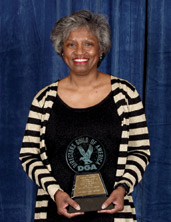 Other attempts to recognize diversity continued in the '90s with the creation of the DGA Diversity Award, given for outstanding commitment to and leadership in the hiring of women and ethnic minorities in DGA categories. Bruce Paltrow, John Wells and Christopher Chulack were the first recipients.
Other attempts to recognize diversity continued in the '90s with the creation of the DGA Diversity Award, given for outstanding commitment to and leadership in the hiring of women and ethnic minorities in DGA categories. Bruce Paltrow, John Wells and Christopher Chulack were the first recipients.
In the '80s and '90s, additional special merit and service awards were created to honor lifelong commitment to the industry and the Guild. The Franklin J. Schaffner Achievement Award for associate directors and stage managers was first instituted in 1991 and presented to Chester O'Brien and Mortimer O'Brien; The Frank Capra Achievement Award for assistant directors or unit production managers was first given in 1980, and winners over the years have included Abby Singer, Howard W. Koch and Herb Adelman. The Robert B. Aldrich Award, occasionally presented to a director for extraordinary service, was first presented to Robert Wise in 1984. In 1998, the President's Award for leadership and extraordinary efforts in enhancing the welfare and image of the DGA and the industry was given to George Sidney, and subsequently presented to Robert Wise and Gil Cates. In addition, the John Huston Award for artists' rights presented by The Film Foundation was given for the first time in 1994 to Fred Zinnemann. Lifetime Achievement Awards for both news direction and sports direction were instituted in the '90s. The DGA also teamed with the Writers Guild of America, west to jointly create and present the Preston Sturges Award for outstanding achievements in both writing and directing; it has been awarded three times: to Richard Brooks, Billy Wilder and Blake Edwards.
And, of course, the aforementioned Lifetime Achievement Award, one of the Guild's highest honors, is presented every few years, most recently in 2006 to Clint Eastwood. Talking about what it meant to him to be receiving the award, Eastwood noted how pleased he had been to join the Guild in 1970 and "join a group that included so many people I'd worked with and known along the way, like William Wellman and Robert Wise, and also so many people I admired: Frank Capra, Howard Hawks, John Ford. They all belonged to it. That's what I said when I was up there on stage accepting the award."
 Even filmmakers who don't regard directing as a competitive sport recognize the communal spirit the DGA Awards are given in. Upon winning for Crouching Tiger, Hidden Dragon, Ang Lee said of his award, "I don't really believe in film competition, but the acknowledgment is a great honor. My work is the result of the collective efforts of everyone working on the film. Let me thank them from the bottom of my heart."
Even filmmakers who don't regard directing as a competitive sport recognize the communal spirit the DGA Awards are given in. Upon winning for Crouching Tiger, Hidden Dragon, Ang Lee said of his award, "I don't really believe in film competition, but the acknowledgment is a great honor. My work is the result of the collective efforts of everyone working on the film. Let me thank them from the bottom of my heart."
Today's DGA Awards require meticulous planning and preparation. Although the nature of the event has changed, the essence of the Awards hasn't. For instance, the dancing part of the evening was phased out in the early '90s. "Hardly anybody danced anymore so we got rid of it. But we added the cocktail reception so that directors could get to meet and talk to each other over cocktails," says Howard Storm, who has chaired the DGA Awards Committee for the last 10 years. In the latter part of the decade, the Awards show moved from the Beverly Hilton, where it had been held since 1978, to its current home at the Hyatt Regency Century Plaza.
But one constant through the last 20 years of the DGA Awards has been the presence of emcee extraordinaire Carl Reiner. The actor/director/comedian has attributed, in his usual tongue-in-cheek fashion, his success at hosting the Awards to "Worry, Trust and Unpreparedness." In recognition of his years of service, Reiner was made an Honorary Life Member at the 2007 Awards.
Planning the next year's ceremony begins almost as the plates are being cleared from this year's event. The DGA Awards show has evolved into an elaborate high-tech, multi-screen presentation with close to 2,000 members, guests, celebrities and press in attendance. With all the logistics involved in pulling off an event like this, it's little wonder that it takes the skill of a DGA crew to run the DGA Awards. Jim Drake has directed the show for the last seven years with the able assistance of other DGA members including associate director Peery Forbis and stage managers Barry Haworth, Ellen Deutsch, C.J. Rapp Pittman and Maria Jimenez-Henley.
The technology behind the Awards is not the only thing that has evolved over the years. As the Guild keeps pace with the ever-changing look of the industry, new awards have been added as new genres have developed. The latest addition was an award for Outstanding Directorial Achievement in reality programs in 2006. In announcing the new award and the reasons for adding it, DGA President Michael Apted said, "Over the past several years, reality television has radically transformed the television landscape and now comprises a substantial portion of the prime-time schedule. It is time to publicly acknowledge the director's role in reality television and to recognize, with a DGA Award, the outstanding directorial achievements of DGA members who work in this genre."
As has been the tradition since its inception 60 years ago, the DGA Awards will continue to evolve to reflect each new technological innovation in the industry. Whatever revolutions the industry goes through, if DGA members are involved in their creation, the DGA Awards will be there to recognize the excellence of their work.
For all the modernization of the show, the meaning of the Awards to the Guild's members has not changed. "When I got the nomination from my peers at the DGA, my fellow citizen soldiers who all had their share of skirmishes and battles," said Steven Spielberg about his nomination for Saving Private Ryan in 1999, "it was only then that I felt completely vindicated. When people who do what you do say they like what you've done, it doesn't matter whether you've been nominated or win, you've been knighted by this roundtable of 12,000 people all wearing the same shoes."